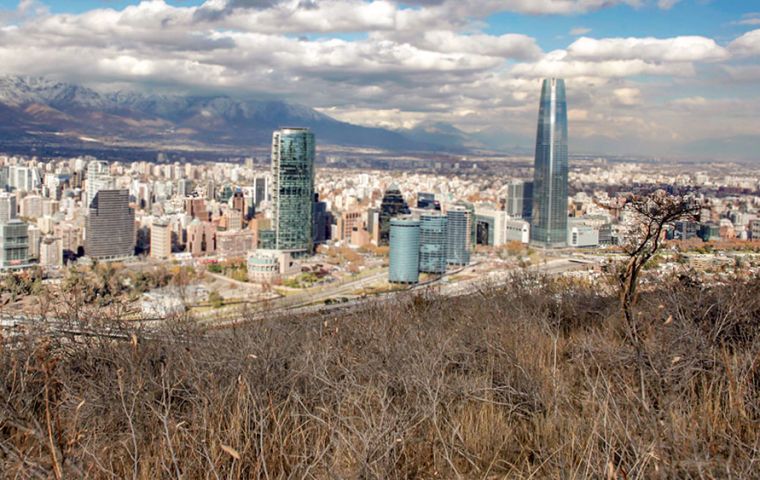MercoPress. South Atlantic News Agency
Chile: Shortage of water reported in Santiago Metropolitan Region
 “The worst drought in history,” said Minister Moreno
“The worst drought in history,” said Minister Moreno Chile's Minister of Public Works Alfredo Moreno Thursday admitted Santiago's Metropolitan Region was going through “the worst drought in history,” which has prompted “exceptional measures.”
The Aguas Andinas company -which supplies drinking water and sewerage to all of Santiago's municipalities except Maipú and Cerrillos- has declared itself in “Preventive Early Warning” and called on users to make efficient and responsible use of a resource which has become scarce due to the absence of water and snow precipitations in the central zone.
Moreno explained the vital El Yeso Reservoir “is at 80% of its maximum capacity, this has only been possible thanks to efficient management in the basin, the redistribution of the resource and the collaborative work between the company and the canalistas. of the first section of the Maipo river.”
In addition to calling for a responsible use of water, Aguas Andinas has ”activated various actions in its operation, mobilizing resources in accordance with its contingency protocols and activating business continuity plans that minimize the risks of restrictions for citizens.”
Moreno reckoned “this is the worst drought in history; in July it rained 0.6 mm, and we had no accumulation of snow. We are with worse indicators even than in 2019. For this reason we are working together with the sanitation companies with exceptional measures in the face of hypedrought. Thanks to the various works carried out by Aguas Andinas, such as the Padre Hurtado Plant and the Cerro Negro-Lo Mena Pozos, as well as the collaborative work with the irrigators, today we are better prepared to face this situation.”
Aguas Andinas Planning Director Cristián Schwerter said that the Preventive Early Warning seeks to anticipate and protect the drinking water supply for the Metropolitan Region. “The situation we live in is complex, since it has practically not rained this winter. Therefore, we have activated our Preventive Early Warning [protocol] associated with the Drought Contingency Plan, which seeks to warn of the scarcity condition evidenced by surface sources and thus raise the alerts to promote a more efficient and responsible use of water, but it does not represent any impact on the drinking water service that citizens receive.”
He added that “the current condition of the El Yeso reservoir is good news, but we are aware that we cannot lower our arms and we must continue to deploy all investments, looking for new alternatives of supply sources and activating all long-term projects which allow us to face not just this summer, but also in the coming periods, as forecasts indicate that drought will continue to hit us.”
Among the contingency plans is the reuse of treated water in biofactories, giving a second life to water and a more efficient use of the resource for purposes such as agriculture, industry and watering of large green areas.
Aguas Andinas is one of the largest sanitation companies in Latin America, serving more than 8 million inhabitants and with a total of more than 71,000 hectares of concession. It is controlled by the Spanish Agbar Group, which also controls Aguas Cordillera and Aguas Manquehue.




Top Comments
Disclaimer & comment rulesCommenting for this story is now closed.
If you have a Facebook account, become a fan and comment on our Facebook Page!